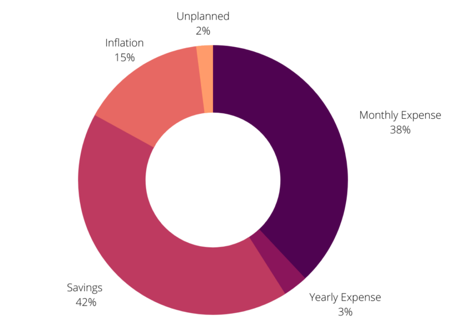Are you having trouble lately of remembering things?
No matter if you are young or old, your brain activity can sometimes go on a lower drive. We see young students having problems concentrating on studies; older people failing to remember names or events as they could even a few years ago; and we often forget our own wedding anniversary dates!
Most of the time people don’t realize that the issues are related to slowing down of their brain activity which is often more of a mental health issue than a physical one. Of course, we can buy medicines and supplements that can have some brain health benefits. But their efficacies are limited and, in most cases, not scientifically proven.
We must remember that among all human organs, the brain needs the most of the nutrients and oxygen all the time. Any deficiency in those supplies can lead to significant damage to physical and mental activities, sickness, depression, and in acute cases, even death.
The bottom line is – if you wish to have a sharp mind, strong memory and a life full of vitality and positivity, stop loading your brain with mood booster drugs and start making your body better nourished and better exercised and less stressed.
A healthy brain not only helps improve memory, mental clarity and countless other cognitive tasks essential for better health and well-being, it may also reduce the risk of diseases such as Alzheimer’s. Since the nerve cells in our brains degrade as we age, there’s no better time than now to keep your brain active, so that it functions well for years to come.
1. Learn something new that you’re not familiar with.
Brain games, such as solving crossword puzzles or sudoku stimulates your cognitive abilities. Also, there are many other things that can increase brain activity and improve cognitive function such as learning how to play a new instrument or sport, picking up a new hobby, or learning a new language. The important thing is that it needs to be something unfamiliar. By performing diverse tasks, you’re working out different parts of your brain.
2. Get at least 30 minutes of exercise three times per week.
Physical exercise supports brain health in several ways. First, it increases the density and size of brain capillaries, which boosts the levels of blood and oxygen to the brain. Second, exercise has been shown to help produce new brain cells by elevating the chemicals that stimulate nerve cell growth. Additionally, it increases the levels of dopamine and serotonin, two chemicals that produce feelings of positive well-being, which is also great for stress relief. At minimum, try to get in 30 minutes of moderate exercise three times a week, such as a brisk walk, slow jog or swim.
3. Take control of your stress level.
We all know that stress, especially chronic stress, can wreak havoc on the body in multiple ways, from raising blood pressure to weakening the immune system. Many studies suggest that the hormonal spikes caused by stress can negatively affect the hippocampus region of the brain over time and increase the acceleration of cognitive decline. For all these reasons, managing stress is extremely important for health, including your brain. Many have found that meditating helps keep their stress levels in check.
4. MEDITATE.
Research shows:
– Meditation improves concentration and memory.
– Meditation allows the brain to process information quicker.
– Meditation strengthens executive functions of the brain (planning, behaviour control, etc.)
– Meditation reduces stress and improves the ability to learn new information.
Some types of meditations are mindfulness meditation, breath awareness meditation, transcendental meditation, zen meditation etc.
5. HAVE POSITIVE RELATIONSHIPS.
The positive, diverse relationships that you have in life often help strengthen certain cognitive areas.
Try to spend as much time as you can with friends and family. When you're connecting with friends and family members, the blood circulates to several different parts of your brain as you're listening and formulating responses.
You are then less likely to get depressed. Depression can hamper how well your brain works. If you're depressed or anxious, the brain becomes so occupied with what-ifs and worries that it's not able to give 100% to learning new things.
The more diverse that your friends and family members are in kind, the more they will expand your creative thinking. In other words, our friends and family members can make us more well-rounded people and keep our minds open.
6. EAT HEALTHY.
Eating healthy increases cognitive ability.
Here are some foods and their respective effects on the brain:
Eat more fruits and vegetables. You should eat at least five servings of fruits and vegetables a day in order to get antioxidants. Antioxidants can stop free radicals from damaging your cells (in a process known as oxidative stress). These free radicals can cause inflammation, damage your DNA, and destroy
cells (including brain cells). To get the most antioxidants (including vitamin C) in your diet, eat:
Berries: blueberries, raspberries, blackberries, strawberries, cranberries and huckleberries.
Brightly colored fruits: pomegranates, cherries, apples, bananas, papayas, pears, plums, pears, oranges, grapefruits, tomatoes and watermelon.
Vegetables: bell peppers, broccoli, brussels sprouts, spinach, Swiss chard, mustard greens, collard greens and kale
Omega 3 oils: Improves learning and memory; protects against mood disorders.
It is obvious that a balanced diet is essential for health on countless levels. Brain cells need some dietary fat to perform their best, and studies have shown that omega-3 fatty acids are the ideal choice. The best sources of omega-3s are fatty fish (e.g., mackerel, herring, sardines, tuna and salmon) and walnuts. Antioxidants from fruits and vegetables have also been shown to play an important role in brain health, protecting brain cells from oxidative damage. Also, curcumin, the main ingredient in turmeric (a bright yellow spice widely used in curry), possesses powerful anti-inflammatory and antioxidant properties that may suppress age-related brain degradation.
The human brain is about 60% fats which need to come from Essential Fatty Acids in the diet. Essential Fatty Acids like omega-3 fatty acids are needed for brain development. Studies have shown that deficiencies in Essential Fatty Acids can affect cognitive development. They can also protect against Alzheimer's and other dementias.
Consume vitamin E. Most adults need 22.5 IU (15 mg) of vitamin E a day. Vitamin E is a fat-soluble vitamin that works as an antioxidant. Studies have shown that Vitamin E may prevent dementia, Alzheimer's, and other age-related cognitive conditions.
To get vitamin E from food, use cooking oils (sunflower, grapeseed, canola, corn, olive and soybean oils), nuts and seeds (sunflower seeds, almonds, hazelnuts, peanuts and pecans) and avocados.
Choose complex carbohydrates.
Your brain needs a steady supply of energy that comes from glucose. Complex carbohydrates that come from whole grains, beans, and legumes, are good sources. This steady supply of glucose to the brain will improve brain function, preventing confusion, foggy thinking, and lack of concentration. To get complex carbs, eat:
Oatmeal, whole grain breads, brown rice, beans, lentils and peas.
7.Drink tea.
Try to drink two to three cups of hot or cold tea a day. Green, black, and white teas all come from the same plant, but contain different flavonoids (plant antioxidants). These antioxidants can protect your cells from free radical damage. They can also increase blood flow to your brain and throughout the body. Studies have shown drinking more than three cups of tea a day can reduce your risk for Parkinson's disease by 22 to 28%.
8. Drink water.
Get in the habit of drinking a glass of water right after you get up in the morning. Your body has become slightly dehydrated through the night and drinking water can restore your brain's hydration. Through the day you should drink six to eight 8-ounce glasses of water. Staying hydrated will prevent dehydration. Dehydration can shrink brain tissue, lower cognitive function, and impair brain function responsible for planning and visual processing.
9. Strive for a Healthy Heart.
The most important strategy, is to work with your doctor to stay on top of your cardiovascular health. You want to keep blood moving easily through your heart and blood vessels. "High blood pressure, high cholesterol levels, smoking, and diabetes all increase the risk for developing neurodegenerative diseases by impeding blood flow to the brain."
When artery walls get thick with plaque or "hardened," a condition called atherosclerosis, it's difficult to get enough blood to the brain and nurture its cells. This can also lead to ischemic stroke when a blood clot forms in an artery, cutting off the blood supply to a section of the brain. That can cause temporary or even permanent brain damage.
A healthy, active lifestyle will go a long way toward keeping your blood flowing and avoiding those problems.
10. Sleep well.
Getting adequate rest is crucial for your body including the brain to perform its best. Some experts believe sleep gives neurons that are active when we’re awake a chance to shut down and repair themselves. Sleep also may give the brain a chance to exercise important neural connections that might otherwise deteriorate from lack of activity. Research also shows that during sleep, the brain clears out toxins called beta-amyloids that can lead to Alzheimer’s and other forms dementia. So, sleep for at least 7 – 8 hours a night.
11. DON’T SMOKE.
Smoking is a bad habit, especially for its physical effects. Smoking increases the risk of asthma and chronic obstructive pulmonary disease. Smoking causes wrinkles and sagging in your facial skin. Moreover, smokers have a higher chance of developing dementia and Alzheimer’s Disease. For those who used to smoke but quit, they showed no increased risk of dementia and had normal brain function into old age. So, quitting apparently showed as good of results as not smoking in the first place.












